February Value of the Month:
Honesty (信)
Honesty (信), in its essence, is the commitment to truthfulness and integrity in all aspects of life. It's a guiding principle that encourages openness, transparency, and sincerity in communication and actions.
At Hatching Dragons Nurseries, we believe that cultivating honesty lays the groundwork for ethical decision-making and fosters a positive, trusting environment for our little learners.
The Concept of Honesty (信)
In the world of early education, honesty extends beyond simple truth-telling.
It involves nurturing a genuine understanding of right and wrong, encouraging accountability for one's actions, and fostering a sense of responsibility towards oneself and others.
Honesty becomes a beacon guiding our young learners as they navigate the intricate journey of character development.
History and Philosophical Roots of Honesty (信)
Throughout human history, the concept of honesty has been interwoven into the fabric of diverse cultures and philosophical traditions.
From ancient civilizations to the present day, honesty has stood as a foundational virtue that transcends boundaries and time.
Early philosophical thinkers such as Socrates and Confucius recognized the moral significance of truthfulness, shaping the ethical principles that guide us.
Socrates, in ancient Greece, believed in the pursuit of knowledge and virtue through sincere dialogue and introspection.
Similarly, Confucius, in ancient China, emphasized the importance of sincerity and truthfulness for a harmonious society.
These philosophical roots laid the groundwork for the enduring value of honesty, resonating through the ages.

As centuries passed, the philosophical roots of honesty continued to flourish.
During the Enlightenment era, reason and transparency became championed, intertwining honesty with intellectual and societal progress.
Thinkers like Immanuel Kant argued for the moral duty to tell the truth, emphasizing the universal nature of honesty as an ethical principle.
Across diverse cultural landscapes, teachings from various faiths and belief systems echoed the importance of honesty in fostering trust, integrity, and a moral compass.
The historical journey of honesty stands as a testament to its enduring relevance, shaping not only individual character but also influencing the moral fabric of societies worldwide.
How we can teach Honesty (信) to our children?
1. Storytelling Sessions
The Honesty Quest
Embark on a storytelling adventure with "The Honesty Quest." Introduce a character who navigates a tricky situation by choosing honesty.
Explore the story together, pausing to discuss how being truthful led to positive outcomes.
Encourage the children to share their thoughts on honesty and relate the tale to their own experiences.
Honesty Heroes Unite
Craft a tale of "Honesty Heroes Unite" where characters join forces to solve a problem through truthful actions.
As the story unfolds, engage the children by asking open-ended questions.
Foster a collaborative atmosphere where everyone can share their thoughts on the importance of honesty and brainstorm similar scenarios in their lives.
2. Role-Playing

Honesty Detective Adventure
Introduce a pretend play scenario where children become 'Honesty Detectives' on a mission to uncover truthfulness. Provide magnifying glasses, detective hats, and notepads. As they navigate through imaginary scenarios, they learn to identify honest actions and understand the value of honesty in problem-solving.
Lost and Found Dilemma
Present a scenario where a child finds a lost toy on the playground. Discuss with the children the various actions they could take, emphasizing the value of honesty in returning the toy to its rightful owner. This real-life example helps them grasp the concept of honesty in practical situations.
Honesty Marketplace
Set up a pretend marketplace with various 'goods' and 'services.' Children can engage in buying and selling, practicing honesty in transactions. Encourage discussions about fair pricing and truthful advertising during this pretend play, instilling early lessons about honesty in commerce.
3. Manners and Etiquette
Honesty Journal Routine
Introduce the concept of building a habit of honesty through journaling.
Encourage children to maintain an "Honesty Journal" where they jot down instances of honesty in their daily lives.
This routine helps them reflect on their actions and gradually cultivates the habit of being truthful in various situations.
Sharing Truthful Compliments
Engage children in a session where they practice giving compliments sincerely.
Encourage them to focus on specific aspects they genuinely appreciate in their peers' actions or creations.
This activity promotes the idea that honesty in compliments strengthens the bond between individuals and fosters a positive atmosphere.
Daily Honesty Pledges
Begin each day with a collective honesty pledge.
Create a simple routine where children, as a group, affirm their commitment to honesty by reciting a pledge.
This daily habit serves as a reminder of the value of honesty and instills it as a foundational aspect of their daily interactions.
4. Leading by Example
Truthful Conversations

Model honesty in everyday conversations with children.
Whether discussing plans for the day or expressing emotions, demonstrate truthful communication.
When faced with questions, provide honest and age-appropriate answers, showcasing that honesty is a cornerstone of respectful dialogue.
Acknowledging Mistakes
Lead by example by openly acknowledging your own mistakes.
Share instances where you made errors and explain how admitting them and making amends is an integral part of being honest.
This practice demonstrates to children that everyone, adults included, embraces honesty and learns from their experiences.
Transparent Decision-Making
Involve children in decision-making processes and be transparent about the reasons behind choices.
By explaining the rationale behind decisions, even simple ones, you illustrate the value of honesty in providing information and fostering understanding within the group.
Honesty in Artwork
Incorporate honesty into art activities by encouraging children to create drawings or paintings that represent the concept.
This hands-on approach allows them to express their understanding of honesty through art, turning the classroom into a visual reminder of the value.
Honesty Bulletin Board
Set up a bulletin board displaying instances of honesty within the classroom.
Encourage children to contribute drawings or notes depicting times when they or their peers demonstrated honesty.
This visual display reinforces the value and creates a shared appreciation for honest actions.
Stories about Honesty (信)
Here are some of our favorite stories about Honesty (信):
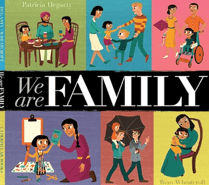 ily - All families are different - and yet in many ways the same! This book uses a gentle rhyming text to follow eight different families, celebrating their everyday differences as well as the similarities they share.
ily - All families are different - and yet in many ways the same! This book uses a gentle rhyming text to follow eight different families, celebrating their everyday differences as well as the similarities they share.H
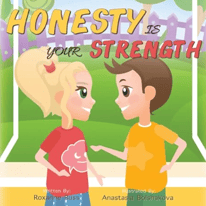 onesty is Your Strength - In this story, cute cousins Mia & Liam break the old garden gnome by accident. They hide the truth from Mia’s parents, and this lie leads to totally unexpected consequences. Cousins learn which emotions come along with lies, where it leads and why it is important to tell the truth. Special emphasis is put on healthy and positive family communication to reinforce the feeling of safety and trust.
onesty is Your Strength - In this story, cute cousins Mia & Liam break the old garden gnome by accident. They hide the truth from Mia’s parents, and this lie leads to totally unexpected consequences. Cousins learn which emotions come along with lies, where it leads and why it is important to tell the truth. Special emphasis is put on healthy and positive family communication to reinforce the feeling of safety and trust.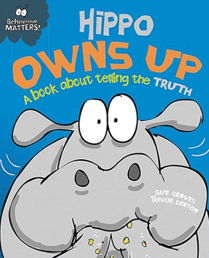 po Owns Up - This funny, charming story is the perfect way to introduce young children to what honesty is, and help them understand the importance of owning up to your mistakes. Also included are suggestions for activities and ideas to talk through together to help children fully understand how their behaviour can impact on others.
po Owns Up - This funny, charming story is the perfect way to introduce young children to what honesty is, and help them understand the importance of owning up to your mistakes. Also included are suggestions for activities and ideas to talk through together to help children fully understand how their behaviour can impact on others. Telling the Truth – A Book about Lying - The preschool and kindergarten years are some of the most important formative years of a person's life. Habits and attitudes developed during these crucial years affect a child for the rest of his or her life. These years are also a challenging time for parents as their children test boundaries (and patience). How parents and children respond makes all the difference in the world. The Growing God's Kids series is designed to help young children understand their feelings, develop godly ways to deal with temptations, and form positive attitudes and behaviors that will serve them well in the future. In Telling the Truth, parents and children are encouraged to address lying and discover the value of telling the truth.
Telling the Truth – A Book about Lying - The preschool and kindergarten years are some of the most important formative years of a person's life. Habits and attitudes developed during these crucial years affect a child for the rest of his or her life. These years are also a challenging time for parents as their children test boundaries (and patience). How parents and children respond makes all the difference in the world. The Growing God's Kids series is designed to help young children understand their feelings, develop godly ways to deal with temptations, and form positive attitudes and behaviors that will serve them well in the future. In Telling the Truth, parents and children are encouraged to address lying and discover the value of telling the truth.
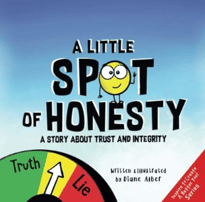 A Little SPOT of Honesty - This is a story about Honesty. Did you know being HONEST is MORE than just about telling the TRUTH? It helps you shows INTEGRITY and earn RESPECT, too. It also help build strong relationships and encourages people to be HONEST with you. Join a little SPOT Of Honesty as he shows you examples of how to be true to yourself and to others!
A Little SPOT of Honesty - This is a story about Honesty. Did you know being HONEST is MORE than just about telling the TRUTH? It helps you shows INTEGRITY and earn RESPECT, too. It also help build strong relationships and encourages people to be HONEST with you. Join a little SPOT Of Honesty as he shows you examples of how to be true to yourself and to others!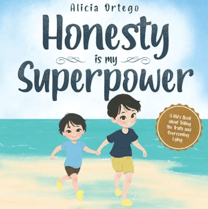 Honesty is my Superpower - Children are always faced with a normal dilemma - should I lie or tell the truth? Our job is to teach them to make the right choice and more importantly, show that honesty is not just saying truth, honesty also means your actions are truthful too. Little Tommy loves everything other kids love but what he likes most is spending time with his older brother Nao. With the help of his brother, Nao, Tommy will learn the effects of lying and how it impacts the feelings of others. Even when he thinks it’s just a joke.
Honesty is my Superpower - Children are always faced with a normal dilemma - should I lie or tell the truth? Our job is to teach them to make the right choice and more importantly, show that honesty is not just saying truth, honesty also means your actions are truthful too. Little Tommy loves everything other kids love but what he likes most is spending time with his older brother Nao. With the help of his brother, Nao, Tommy will learn the effects of lying and how it impacts the feelings of others. Even when he thinks it’s just a joke.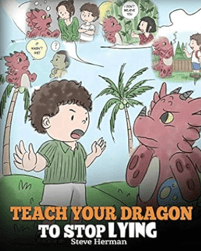 Teach Your Dragon to Stop Lying - Having a pet dragon is very fun. You can teach your dragon to sit, stand, roll over, and you can even potty train him... But what if your dragon keeps telling lies? What if he thinks that lying is good for him, and lying helps him get out of troubles easily anytime? What do you do? You teach him that lying is bad, and you help him understand the reasons why he needs to be honest and telling the truth. How do you do it?
Teach Your Dragon to Stop Lying - Having a pet dragon is very fun. You can teach your dragon to sit, stand, roll over, and you can even potty train him... But what if your dragon keeps telling lies? What if he thinks that lying is good for him, and lying helps him get out of troubles easily anytime? What do you do? You teach him that lying is bad, and you help him understand the reasons why he needs to be honest and telling the truth. How do you do it?
 I Didn't Do It! - Poppy doesn't always tell the truth at home. She doesn't always tell the truth at school either. Now she's getting other children into trouble. Can she learn that it's better to own up than to tell a lie?
I Didn't Do It! - Poppy doesn't always tell the truth at home. She doesn't always tell the truth at school either. Now she's getting other children into trouble. Can she learn that it's better to own up than to tell a lie?
The Boy Who Cried Wo lf - This is a new title in the fantastic 'First Reading' series, aimed at children who are beginning to read. Sam should be looking after his sheep, but instead he can't help but play cruel tricks on the villagers by crying wolf. Will Sam soon be caught out by his own joke? This title provides clear and compelling text accompanied by vibrant original illustrations by Mike Gordon. It is developed in consultation with Alison Kelly, who is a senior lecturer in education and an early reading specialist from Roehampton University. It is a great value quality hardback with ribbon marker guaranteed to foster pride in book ownership.
lf - This is a new title in the fantastic 'First Reading' series, aimed at children who are beginning to read. Sam should be looking after his sheep, but instead he can't help but play cruel tricks on the villagers by crying wolf. Will Sam soon be caught out by his own joke? This title provides clear and compelling text accompanied by vibrant original illustrations by Mike Gordon. It is developed in consultation with Alison Kelly, who is a senior lecturer in education and an early reading specialist from Roehampton University. It is a great value quality hardback with ribbon marker guaranteed to foster pride in book ownership.
 The Fibbing Giraffe - Why Do Kids Lie? Apart from trying to cover up their mischief and “oopsies”, kids are also experimenting with their imagination. If you think about it, lying takes a lot of work! You have to understand that the person you’re lying to doesn’t “know what you know”. And then you have to use creativity and brain-power to conjure a story that makes sense! There’s a lot of mental work that goes into lying. So when your kiddo first starts to tell lies, it’s a sign that he or she is getting smarter! BUT there are things you can do as a parent to prevent lying as a bad habit. Our favorite way? Stories.
The Fibbing Giraffe - Why Do Kids Lie? Apart from trying to cover up their mischief and “oopsies”, kids are also experimenting with their imagination. If you think about it, lying takes a lot of work! You have to understand that the person you’re lying to doesn’t “know what you know”. And then you have to use creativity and brain-power to conjure a story that makes sense! There’s a lot of mental work that goes into lying. So when your kiddo first starts to tell lies, it’s a sign that he or she is getting smarter! BUT there are things you can do as a parent to prevent lying as a bad habit. Our favorite way? Stories.
 The Truth According to Arthur - Arthur and The Truth are not the best of friends right now. Why? Because today Arthur did something he shouldn't have done - he rode on his big brother's bike (when his mum told him not to) and then he accidentally bumped it into Mum's car. Arthur knows he's done wrong but will he tell the truth OR will he bend it, stretch it, cover it up, hide it ... ? What would YOU do? What will Arthur do? Find out in this fresh and funny take on a common childhood predicament - to tell the truth or to tell a little fib.
The Truth According to Arthur - Arthur and The Truth are not the best of friends right now. Why? Because today Arthur did something he shouldn't have done - he rode on his big brother's bike (when his mum told him not to) and then he accidentally bumped it into Mum's car. Arthur knows he's done wrong but will he tell the truth OR will he bend it, stretch it, cover it up, hide it ... ? What would YOU do? What will Arthur do? Find out in this fresh and funny take on a common childhood predicament - to tell the truth or to tell a little fib.
Conclusion
In cultivating the value of Honesty (信), we embark on a journey of ethical exploration, promoting a culture of integrity and trust in our nursery community.
As educators, parents, and caregivers, we play a pivotal role in shaping the moral compass of our young learners.
By instilling the virtue of honesty, we contribute to their holistic development, preparing them to navigate the world with authenticity and principled character.
Tags:
Parenting Tips, Value of the Month, Truth builds Trust, Truthful, Moral Character, Behavior, Honesty
31-Jan-2024 19:50:02
Related Articles

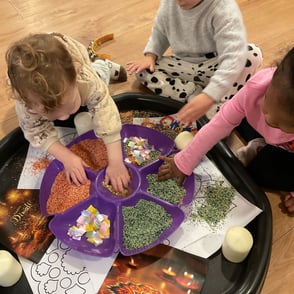


Write a Comment